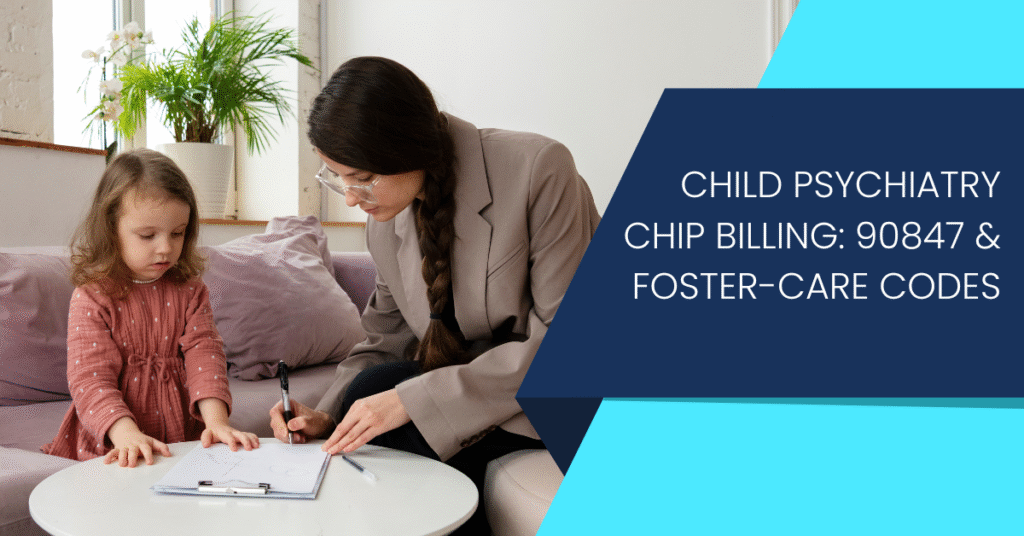Child Psychiatry CHIP Billing in Texas can be difficult. This is especially true for CHIP (Children’s Health Insurance Program) and foster-care cases. Accurate billing is important. It helps practices get paid and follow state and federal rules. This guide is for Texas psychiatry practices and billing teams. It explains billing best practices and gives a checklist for services like The Medicators.
What is CHIP?
CHIP provides health insurance for children whose families earn too much for Medicaid but cannot afford private insurance. In Texas, CHIP covers most mental health services, including:
- Psychiatric evaluations
- Therapy sessions
- Medication management
Foster-Care Billing
Children in foster care often need special psychiatric care. They may face trauma, neglect, or behavior problems. Billing for foster-care cases is different. You must:
- Use the correct codes
- Keep proper records
- Follow Texas rules
Proper billing helps practices get paid faster. It also keeps them safe from audits or rejected claims.
Key CPT Codes for Child Psychiatry
Texas psychiatrists should know these CPT (Current Procedural Terminology) codes:
|
CPT Code |
Description | When to Use |
Notes |
|
90847 |
Family Psychotherapy (with patient) | Session includes child and family | Record family participation |
| 90846 | Family Psychotherapy (without patient) | Parent guidance or foster-care planning |
Note patient absence |
| Outpatient follow-up | Routine therapy check-ins | Use time-based billing | |
| 99366 | Medical team conference | Multi-disciplinary team meetings |
Needed for complex foster-care cases |
|
T1023 |
Case management | Work with foster children |
Maintain detailed records |
Using these codes correctly is very important. Using wrong codes may cause audits or denied claims.
Common Billing Problems
1. Documentation Mistakes
One of the main reasons for denied claims is poor documentation. To avoid this:
- Note who attended the session (child, parent, caseworker)
- Specify the type of session
- Explain why the session was needed
2. Wrong CPT Codes
Incorrect CPT codes are common. For example, billing 90847 when the child was absent will cause problems. Always check:
- Was the child present?
- How long was the session?
- Does CHIP cover this session?
3. Missed Foster-Care Rules
Foster-care sessions have extra rules:
- Include foster-care information on claims
- Record meetings with caseworkers
- Keep notes of team discussions
Telepsychiatry and CHIP Billing
Telepsychiatry is growing in Texas, especially in rural areas. When using telehealth:
- Add the correct telehealth modifiers to CPT codes
- Use HIPAA-compliant platforms
- Keep records of online consent
Example: A foster child has a 45-minute telepsychiatry session with a family member. Bill 90847 with a telehealth modifier. Make sure notes show who attended and that the session was online.
CHIP & Foster-Care Billing Workflow
A clear workflow reduces mistakes. Here is a simple process for Texas practices:
|
Step |
Action | Who Does It |
Notes |
|
1 |
Check insurance | Front desk | Confirm CHIP and foster-care status |
| 2 | Schedule session | Scheduler |
Decide if family or child must attend |
|
3 |
Conduct session | Psychiatrist | Record participants and session type |
|
4 |
Code session | Billing specialist | Use correct CPT and modifiers |
| 5 | Submit claim | Billing team |
Include foster-care information |
| 6 | Track payment | Billing coordinator |
Monitor denials and appeals |
This workflow helps practices like The Medicators get paid faster and stay compliant.
Real-Life Example
A Texas clinic treats a foster child with anxiety and ADHD. The child attends therapy with a foster parent and caseworker. The billing steps are:
- Note everyone who attended
- Use 90847 for family therapy with the child
- Add foster-care information on the claim
- Include telehealth modifier if the session was online
- Submit the claim to CHIP
This process ensures the claim is correct and avoids denials.
Tips for Compliance
- Train Staff Often – Keep them updated on CPT codes and CHIP rules
- Audit Claims Regularly – Check for errors monthly
- Use Technology – EHRs and billing software can track CHIP and foster-care cases
- Have Clear Policies – Write guidelines for family therapy, foster care, and telepsychiatry
Benefits of Specialized Billing Services
Working with experts like The Medicators helps Texas psychiatry practices:
- Save time on billing
- Follow CHIP and foster-care rules
- Improve payment speed
- Get advice on complex cases
Specialized teams know Texas Medicaid and CHIP rules. Psychiatrists can focus on patient care instead of paperwork.
Conclusion: Child Psychiatry CHIP Billing in Texas
Billing for child psychiatry under CHIP and foster care in Texas needs care and accuracy. Key codes like 90847, 90846, and 99213 must be used correctly. Proper documentation, telepsychiatry rules, and foster-care details are important.
Following a clear workflow and best practices helps avoid mistakes and ensures timely payment. Using billing services like The Medicators makes the process easier and lets psychiatrists focus on children’s mental health care.
FAQs: Child Psychiatry CHIP Billing in Texas
1. What is CHIP and how does it affect child psychiatry billing in Texas?
CHIP provides health coverage for children, and proper Child Psychiatry CHIP Billing in Texas ensures claims are accurate and reimbursed.
2. Which CPT codes are essential for foster-care psychiatry billing in Texas?
Key codes like 90847, 90846, and 99213 are critical for Child Psychiatry CHIP Billing in Texas and foster-care claims.
3. How can telepsychiatry sessions be billed under CHIP and foster-care programs?
Telepsychiatry visits must use correct modifiers and documentation for Child Psychiatry CHIP Billing in Texas compliance.









